
How often do you write? How much do you write? Do you always need an audience for what you write or do you write just for yourself at times?
Writing, in my opinion, is the most potent tool of learning and thinking that the human race has got available to it. We need to write in order to find out what we think and in order to shape our learning. The evidence from cognitive psychology and psycholinguistics is quite conclusive; writing is a highly complex act which depends upon analysis and synthesis of many different levels of thinking. I have a strong conviction that sustained engagement with the written form of language actually changes us cognitively. – Dr. Brian Cambourne
I heard those words from Dr. Brian Cambourne at an education conference I attended in Singapore back in 1986. I wish I could share all the lectures that he gave during those few days but I only have it in video format and I’m not going to transcribe it all for you. Sorry.
Dr. BRIAN CAMBOURNE started his career by teaching for fifteen years in a variety of small, mostly one-teacher schools. He has since become one of Australians most eminent researchers of literacy and learning. He was a post-doctoral Fellow at the Harvard Graduate School of Education.
What’s he saying? To over simplify, he’s saying that the very act of writing helps us to map out our thoughts and helps us learn. The processes that we use for writing are more powerful than the acts of simply speaking or listening.
Most bloggers would know this to be true. Even in the simple act of writing a blog post we can write, read, correct, read, restructure and read again before we finally hit the publish button. We take care to make sense and to be understood and it is in this process that we often more fully develop our own understanding of the subject matter.
Cambourne’s big concern was that most of us don’t engage with the written form of language nearly enough. Somewhere in the process of learning literacy we have adopted the thought that we’re not very good at writing and that it’s not something that most of us would do voluntarily without very good reason.
The very fact that we consider writing as something specialised that most people can’t do is a problem. We should all consider ourselves to be writers, whether that’s as someone who writes for a living or simply writes for their own benefit.
Even though the standard is sometimes less than brilliant, blogging has at least got millions of people mapping out their thoughts through writing but we need to encourage more people to write, even if their words will never be read by another person.
Do you want to find out what you really think about a topic? Sit down for a while and starting writing. Want to figure out a complex issue? Get writing.
What about you? Do you find writing difficult? How much do you write each day? Do you find that writing helps you clarify things in your own mind? Does it help you learn?
Do you think some of your friends would enjoy reading Do you consider yourself to be a writer?? Please use the buttons below to share the post. Thanks.

 What are your memories of your school years? Was school a happy place or something to be endured?
What are your memories of your school years? Was school a happy place or something to be endured? Christian education is a subject that evokes a wide range of opinions. Some feel that it’s the only reasonable option in current times, while others would say that it brainwashes children or that it places young people into a false reality, cocooning them away from ‘real life’.
Christian education is a subject that evokes a wide range of opinions. Some feel that it’s the only reasonable option in current times, while others would say that it brainwashes children or that it places young people into a false reality, cocooning them away from ‘real life’.